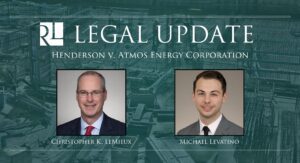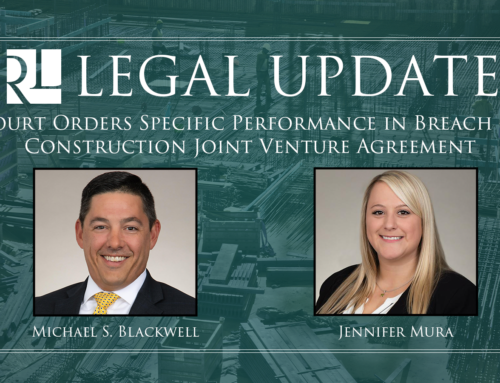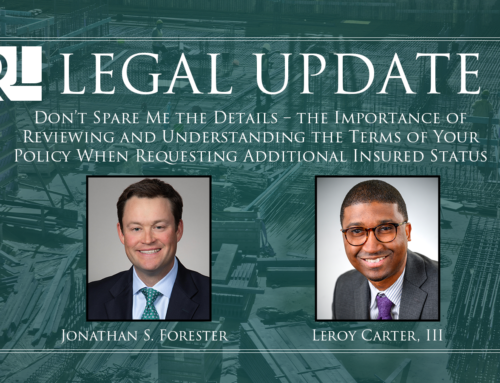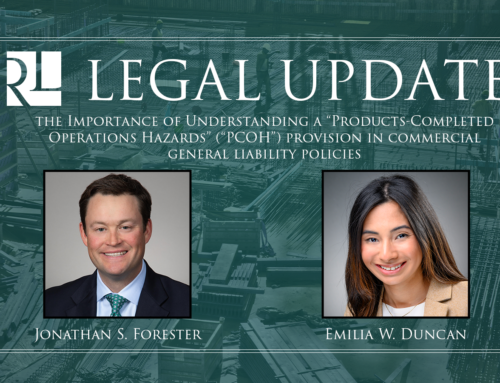 Henderson v. Atmos Energy Corporation
Henderson v. Atmos Energy Corporation
The United States Fifth Circuit Court of Appeal recently addressed whether a contractor can be held vicariously liable for acts of an independent contractor.
Authors: Christopher LeMieux and Michael Levatino
The United States Fifth Circuit Court of Appeal recently addressed whether a defendant can be held vicariously liable for the acts of an independent contractor. The Court also highlighted the importance of properly supporting a motion for summary judgment.
In a recent decision, Henderson v. Atmos Energy Corporation, 2022 WL 3657191 (E.D. 2022), the United State Fifth Circuit Court of Appeal reviewed a defendant’s motion for summary judgment seeking to dismiss the plaintiff’s claim that arose from acts of the defendant’s subcontractor and/or alleged independent contractor. The plaintiff, Steven Henderson, sustained injuries from a slip and fall that resulted from work performed by Atmos Energy Corporation’s (“Atmos Energy”) subcontractor, Miller Pipeline, LLC (“Miller”). Mr. Henderson filled suit against Atmos Energy for damages. Atmos Energy removed the case to the Eastern District and filed a third-party demand against Miller requesting defense and indemnity in the event judgment is rendered against Atmos Energy. Nine months after Miller was added to the lawsuit via Atmos Energy’s third-party demand, Mr. Henderson requested leave to amend its petition to add Miller as a defendant, which the court denied. Subsequently, Atmos Energy filed a motion for summary judgment seeking dismissal on the basis that it cannot be held vicariously liable for the acts of Miller.
Specifically, Atmos Energy submitted the master service agreement (which included an independent contractor provision and a specific scope of work), the task request, deposition testimony, and an affidavit of its manager of engineering. Mr. Henderson attempted to rebut Atmos Energy’s motion alleging there was a material issue of fact. The Eastern District of Louisiana granted Atmos Energy’s motion and the Mr. Henderson appealed.
On appeal, the Fifth Circuit upheld the granting of Atmos Energy’s motion finding that Mr. Henderson failed to create a material issue of fact sufficient to deny Atmos Energy’s motion. The Court reviewed the Mr. Henderson’s three assignments of error. First, Mr. Henderson argued that there was an ambiguity between the master service agreement and the task request. The court dismissed the argument as it was not raised at the district court.
Next, the Mr. Henderson argued that the five-factor test – employed by Louisiana courts to determine whether an individual is an independent contractor – leans in favor of the Miller being an employee rather than an independent contractor. The Court dismissed Mr. Henderson’s argument citing that Atmos Energy brought forth such evidential support that the Miller was not an employee but an independent contractor on all factors. Moreover, Mr. Henderson brought forth no extrinsic evidence to support that Miller was not an independent contractor, but instead, relied on broad conclusory statements. Thus, there was no material issue of fact.
Finding that Atmos Energy’s subcontractor was, in fact, an independent contractor, the court addressed the Mr. Henderson’s argument that there was a material issue of fact whether Atmos Energy exercised operation control over Miller such that it can be held vicariously liable for the acts of Miller. The court noted that a principal can be held vicariously liable for actions of its independent contractor when it reserves the right to supervise or control the contractor’s work. The court noted that Atmos Energy did reserve the right to inspect the work site, but it did not rise to the level of operational control. Further, the court stated that Atmos Energy presented evidence it did not exercise control and the Mr. Henderson provided no evidence to the contrary. Therefore, the court found that the Mr. Henderson failed to carry its burden and there is no genuine issue of material fact.
The Fifth Circuit’s ruling in Henderson v. Atmos Energy provides two important reminders. First, contractors could be held vicariously liable for acts of its independent contractors if said contractor exercises operational control over said independent contractor. Secondly, the court’s ruling impresses the importance of properly supporting a motion for summary judgment. As indicated by the court’s ruling, the defendant submitted multiple documents, deposition testimony, and an affidavit to support its motion for summary judgment. But the plaintiff only provided broad and conclusory statements unsupported by the record. As indicated by the court’s ruling, a properly supported motion can make or break a motion for summary judgment.



